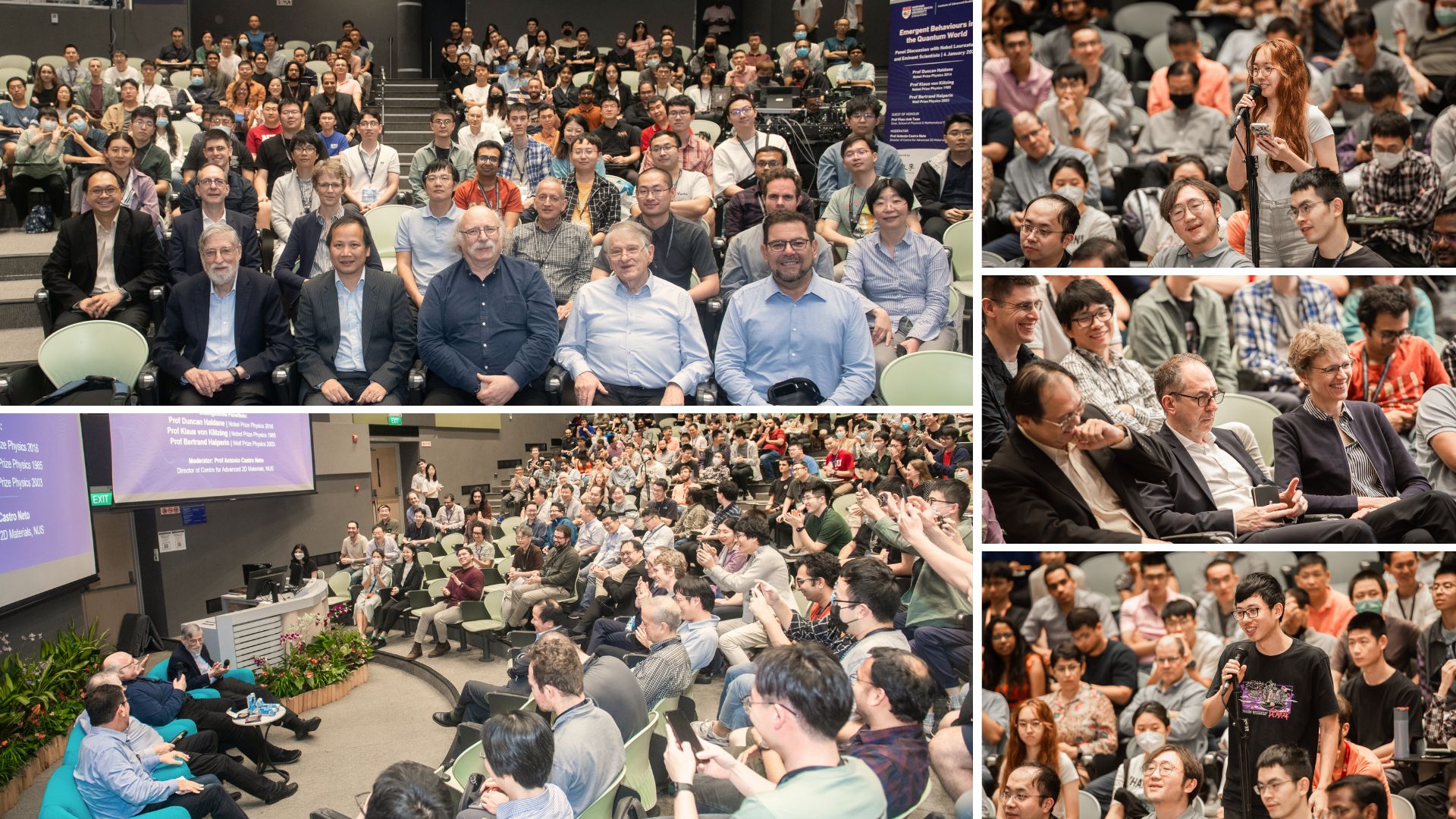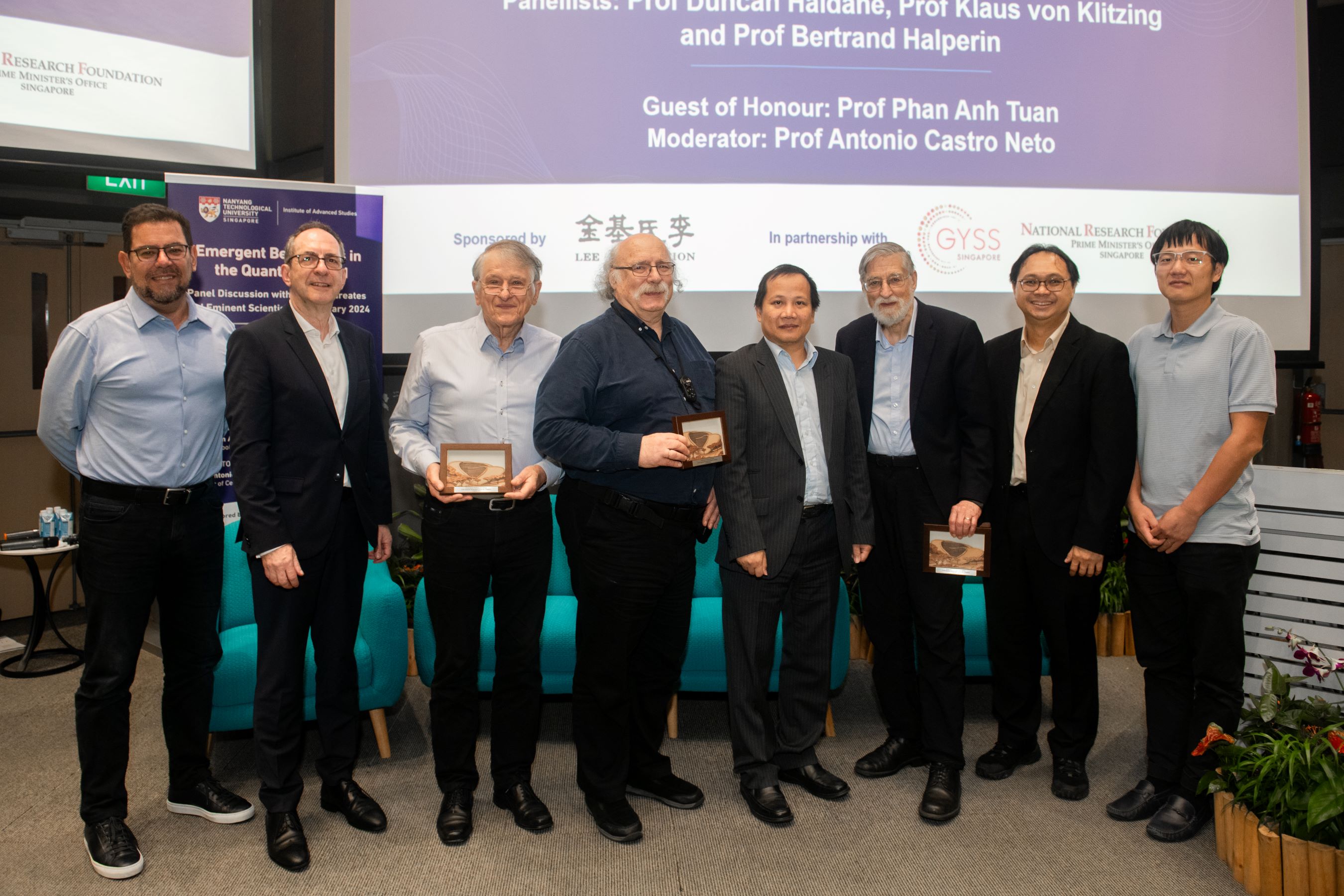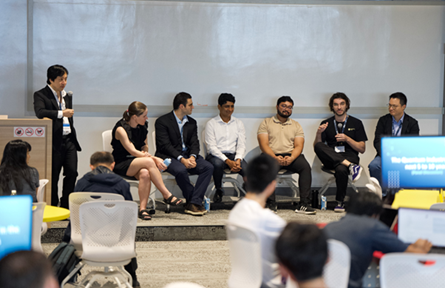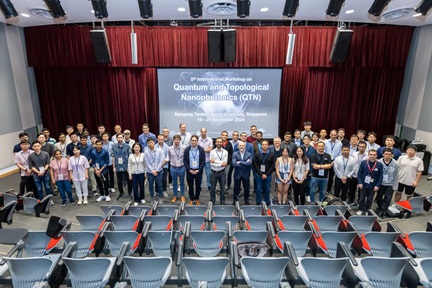IAS Panel Discussion with Nobel Laureates and Eminent Scientists
Navaratna Nikhil | PhD Student, School of Physical and Mathematical Sciences, NTU

In the pursuit of advancing knowledge and facilitating a deeper understanding of our world, the panel discussion titled “Emergent behaviours in the quantum world” symphonised ideas, insights, and the collective wisdom of Prof Duncan Haldane, Prof Klaus von Klitzing, and Prof Bertrand Halperin.
Prof Duncan Haldane, Nobel Prize in Physics 2016 is a professor of physics at Princeton University. Prof Klaus von Klitzing, Nobel Prize in Physics 1985 is the director of Max Planck Institute for Solid State Research and Prof Bertrand Halperin, Wolf Prize in Physics 2003 is a professor at Harvard University.
Held on 4 January 2024 in conjunction with the 9th International Workshop on Emergent Phenomena in Quantum Hall Systems at NTU, the panel discussion was organised as a partner event of the National Research Foundation's Global Young Scientists Summit 2024, with support from Lee Foundation. The event at Tan Chin Tuan Lecture Theatre drew over 300 attendees. Prof Sum Tze-Chien, Director of the Institute of Advanced Studies, extended a gracious welcome, followed by insightful opening remarks from Prof Phan Anh Tuan, Chair of the School of Physical and Mathematical Sciences at NTU.

Top [from left]: Prof Antonio Castro Neto (moderator) and distinguished panellists Prof Klaus von Klitzing, Prof Duncan Haldane and Prof Bertrand Halperin. Bottom (from left): Prof Sum Tze-Chien extended a gracious welcome, followed by insightful opening remarks from Prof Phan Anh Tuan.
The panel discussion, moderated by Prof Antonio Castro Neto (Director of the Centre for Advanced 2D Materials at NUS), started off with a discussion on what the three panellists felt was interesting in science right now. Prof Klaus von Klitzing expressed awe at how the mathematical problems of yesteryears were concrete applications of today. In a similar vein, Prof Duncan Haldane discussed how quantum entanglement now gives a new way of thinking about quantum physics. Prof Bertrand Halperin emphasised how principles of quantum mechanics can help solve engineering problems.
The discussion then shifted to the evolving landscape of quantum mechanics education, with a consensus among panellists that applications bring novel teaching opportunities, although Prof Bertrand Halperin highlighted the persistence of fundamental principles. Prof Klaus von Klitzing shared a captivating personal anecdote, marvelling at how fundamental constants, like the von Klitzing constant, now define standard units. Transitioning to the topic of quantum computing, the panellists agreed that while quantum computers have the potential to propel advancements in quantum mechanics and serve advanced applications, they are unlikely to replace personal computers.
 Enthusiastic audiences in the IAS Panel Discussion engaging with insightful questions, creating a dynamic exchange of ideas.
Enthusiastic audiences in the IAS Panel Discussion engaging with insightful questions, creating a dynamic exchange of ideas.
An exciting Q&A with the audience followed where questions ranging from the implications of the fundamentally probabilistic nature of quantum mechanics on quantum computing to the panellists' views on the exciting area of room temperature superconductivity were posed. The audience were enthralled by the depth of the knowledge of the panellists who linked their fundamental understanding to advanced applications. When asked what advice they would give to the audience, the panellists underscored the importance of following one’s passions, the endless possibilities present on the path to understanding the world and how this freedom enables us to optimise our way.
 [From left] Prof Antonio Castro Neto, Dr Norbert Riedel (German Ambassador to Singapore), Prof Klaus von Klitzing, Prof Duncan Haldane, Prof Phan Anh Tuan, Prof Bertrand Halperin, Prof Sum Tze-Chien and Nanyang Assistant Prof Yang Bo.
[From left] Prof Antonio Castro Neto, Dr Norbert Riedel (German Ambassador to Singapore), Prof Klaus von Klitzing, Prof Duncan Haldane, Prof Phan Anh Tuan, Prof Bertrand Halperin, Prof Sum Tze-Chien and Nanyang Assistant Prof Yang Bo.
The discussion was very well received by the audience who were infused with inspiration and enthusiasm for emergent phenomena in sciences.
"The panelists were humble and very open to the questions posed by the audience, making it an enjoyable experience for all involved." - Choong Li Yan Anthony (PhD Student, MSE NTU)
"I think the panelists did a good job framing their field in the context of science and provided good general research career advice" - Yuhas Michael John (PhD Student, IGP NTU)














/enri-thumbnails/careeropportunities1f0caf1c-a12d-479c-be7c-3c04e085c617.tmb-mega-menu.jpg?Culture=en&sfvrsn=d7261e3b_1)

/cradle-thumbnails/research-capabilities1516d0ba63aa44f0b4ee77a8c05263b2.tmb-mega-menu.jpg?Culture=en&sfvrsn=1bc94f8_1)






